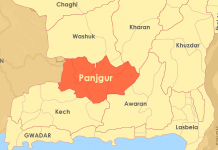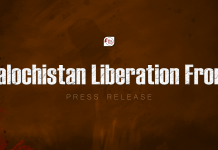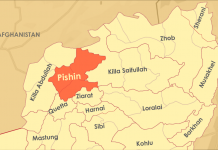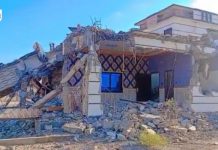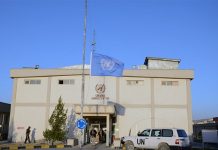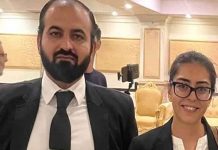Author: H.Baloch
On the dawn of October 6th, 1958, Pakistani forces laid siege to Kalat, the historical capital of the Khanate of Balochistan. The ensuing operation by the Pakistani army for quelling an alleged “revolt” -that set the stage for Iskander Mirza’s martial law, the first in what would go on to be a long list of dictators in the Land of the Pure- that was not only indiscriminate towards the natives but it did not even spare the Central Mosque of Kalat, Pakistani forces targeted the minaret of the mosque carrying the Khanate’s flag bearing the words “Allah-o-Akbar” or God is Great and the Kalma-e-Tayyaba, “La Ilaha Ill-Allah Muhammad-ur-Rasoolullah”: the Islamic Declaration of faith of Allah being the One True God and Muhammad being his final messenger. The army of the country founded in the name of Islam, desecrated the very symbols of Islam: the mosque as well as holy texts that day.
The siege on Kalat forced the Baloch to take up arms against the occupying Pakistani forces, the most important leader of the resistance was the aged Nawab Nauroz Khan, who, when the Pakistani forces could not outfight, chose to deceive with an offer of peace talks, under oath on the Koran. The Nawab being a man of his word, believed the Pakistani army and as soon as he came down, from the Jhalawan mountains, was taken into custody along with his comrades and put in the notorious “Quli” interment camp for interrogation. If desecrating the symbols of Islam were not enough the Army of the newfound Islamic Republic now went on to exploit the sanctity of Koran.
Around a decade later in September 1970 when Palestinian refugees who had fled to Jordan, the other half of their occupied country, took up arms against the occupying Jordanian Government, the Pakistani military aided the occupying government by sending its advisors who planned what was later called “Black September”: one of the most brutal military operations in the region’s history. The Fort of Islam now helped in decisively crushing a movement that many Pakistanis themselves, to-date, consider to truly be a holy war.
During the same decade, in 1971, when East Pakistan was fighting for its independence which the Pakistan Army chose to counter with genocide. Places of worship, in contradiction with all international laws and treaties, including mosques were targeted with impunity. Both the lives of people as well as religious texts were desecrated. One particularly macabre episode was the Shankari Bazaar Mosque massacre in Dhaka where both the people seeking refuge in the mosque and the mosque complex were targeted by the Pakistani Army. Just two years after the debacle in Bangladesh, the Pakistan Army started another genocidal operation, this time again in Balochistan. Whereas the operation was as indiscriminate as it could be, and mosques were no exception, there is one particular instance where the Pakistani army, used a mosque as cover to take out the legendary tribal warrior, Lawang Khan Mengal. The fighting broke out when Lawang Khan, a septuagenarian at the time, refused to surrender to the Pakistan Army. The ensuing gun battle claimed the lives of multiple army men and it was then that the Pakistan Army sent some of its soldiers to sneak into the mosque and shoot Lawang Khan from it. The Pakistan Army’s plan materialized as Lawang Khan was fighting by the Baloch Nang (Code of Honor), which expects the Baloch to respect all places of worship while the Pakistan Army has never had any honor.
Fast forward to the 2000s, following the events that occurred on 9/11, Pakistan Army’s strategic assets turned out to be liabilities and to save its face, Pakistan employed a strategy of ruthless duplicity, where it misled NATO into targeting the wrong people with false intelligence. Two such slaughterous drone strikes were both carried out on mosques that left more than 80 people dead in Bajaur Agency (2006) and at least 26 people in Datakhel (2011), worshippers, including women and children. In 2007, following the seizure of Chinese masseuses in Islamabad by stick-wielding female students of the Lal Masjid madrassah, the Pakistani army found an opportunity to deceive an increasingly skeptical West. The siege and subsequent storming of the mosque complex lasted nine grueling days, pitting the nuclear-armed Fort of Islam’s special forces, backed by gunship helicopters, against a handful of clerics and their female students. The Pakistani army once again resorted to underhanded tactics, from employing phosphorous rounds against civilians to aerial bombardment. Even after the complex was declared clear, the media and civil society were barred from accessing the site until it had been sanitized of the chemicals used during the raid. Pakistani journalists, including the respected Hamid Mir, uncovered a dumping ground containing not only the remains of slain students but also charred pages of the Holy Koran.
The army has also engaged in the distortion of Islamic teachings to serve its own ends. A prime example is the hadith about the “Ghazwa-e-Hind,” the purported great invasion of India. Its authenticity and precise reference—whether to present-day India or another location—have been subject to scholarly debate. Yet, this hadith is frequently cited by the army’s proxies, such as the Jaish, to justify their terrorist activities in India.
Recently, in the wake of the Baloch Raaji Muchi in Gwadar, orchestrated by the Baloch Yakjehti Committee (BYC), which defied the Pakistani Army’s iron fist, a de facto referendum emerged. In retaliation, the army unleashed its digital hordes against Dr. Sabiha Baloch, a beacon of Baloch resistance. A malicious campaign, reeking of desperation, sought to brand her a blasphemer. This was a blatant attempt to incite religious extremists against a woman who dared to challenge the army’s hegemony.
The audacity of accusing Dr. Sabiha of blasphemy while the army itself desecrates mosques and manipulates Islamic narratives is staggering hypocrisy. While Jinnah, a questionable Muslim, is elevated to sainthood, a true champion of human rights is vilified. Is it her gender, her Baloch identity, or her unwavering courage that terrifies the army? Perhaps it’s the growing realization that the Baloch, under the leadership of brave and committed individuals like her, are unshackling themselves from the chains of oppression.
The army’s actions are not merely an attack on an individual; they are a desperate attempt to stifle the Baloch people’s aspirations for freedom and self-determination. By exposing this sinister campaign, we must unite against the forces that seek to divide us and erode the very fabric of our society.
Disclaimer: The views and opinions expressed in this article are those of the author and do not necessarily reflect the official policy or position of The Balochistan Post or any of its editors.











